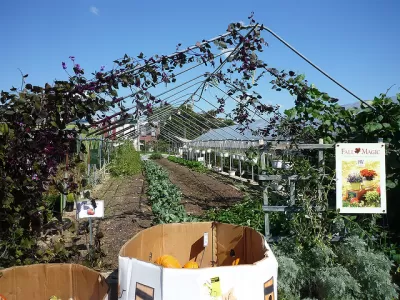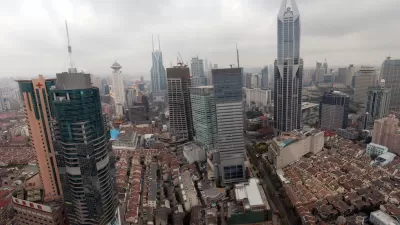For the first time, the state of Minnesota is offering money specifically for urban agriculture, in a win for urban farmers who want to challenge the notion that agriculture is necessarily a rural enterprise.

Though relatively modest, Minnesota's new urban agriculture grants may nurture a change in perceptions. Taryn Phaneuf writes, "Advocates said state investment is crucial because it lends credibility to what [one grant recipient] calls the 'changing face of agriculture.' Such state funding, even a small amount, can usher in a shift toward seeing urban areas as potential farms and their residents as fellow food producers."
The legislation that established the new grants took several years to get passed, primarily though the efforts of bill author Karen Clark (DFL-Minneapolis). Grants total $10 million a year, and they're funded through Minnesota's Agricultural Growth, Research, and Innovation program (known as AGRI), which supports agriculture and renewable energy in the state.
While the grants are only guaranteed through next year, advocates hope urban agriculture will retain its seat at the state table. Phaneuf elaborates: "A local food system – which includes everything from growing food to processing it to buying and consuming it – also creates jobs, income, and infrastructure. That’s the mindset used to justify public spending on agriculture development in Greater Minnesota, like one that helps farmers modernize their livestock operations by, say, expanding their facilities to hold more animals."
FULL STORY: State grant program offers money, and legitimacy, for urban agriculture

Planetizen Federal Action Tracker
A weekly monitor of how Trump’s orders and actions are impacting planners and planning in America.

San Francisco's School District Spent $105M To Build Affordable Housing for Teachers — And That's Just the Beginning
SFUSD joins a growing list of school districts using their land holdings to address housing affordability challenges faced by their own employees.

The Tiny, Adorable $7,000 Car Turning Japan Onto EVs
The single seat Mibot charges from a regular plug as quickly as an iPad, and is about half the price of an average EV.

Seattle's Plan for Adopting Driverless Cars
Equity, safety, accessibility and affordability are front of mind as the city prepares for robotaxis and other autonomous vehicles.

As Trump Phases Out FEMA, Is It Time to Flee the Floodplains?
With less federal funding available for disaster relief efforts, the need to relocate at-risk communities is more urgent than ever.

With Protected Lanes, 460% More People Commute by Bike
For those needing more ammo, more data proving what we already knew is here.
Urban Design for Planners 1: Software Tools
This six-course series explores essential urban design concepts using open source software and equips planners with the tools they need to participate fully in the urban design process.
Planning for Universal Design
Learn the tools for implementing Universal Design in planning regulations.
Smith Gee Studio
City of Charlotte
City of Camden Redevelopment Agency
City of Astoria
Transportation Research & Education Center (TREC) at Portland State University
US High Speed Rail Association
City of Camden Redevelopment Agency
Municipality of Princeton (NJ)




























